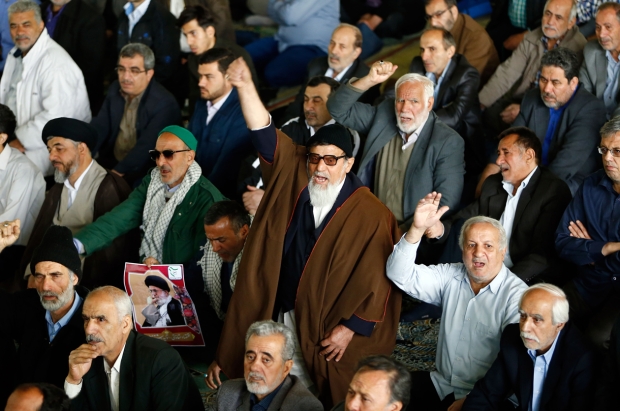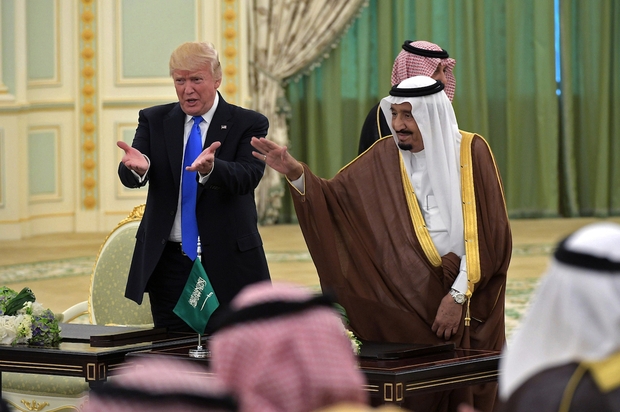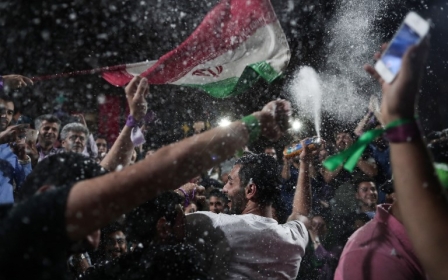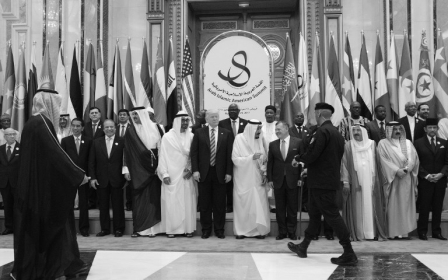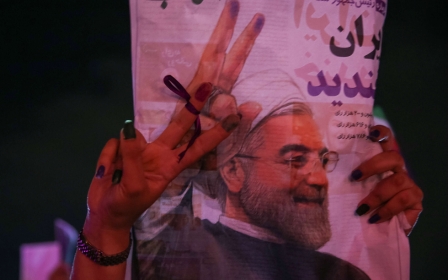Rouhani and Iran's foreign policy: Between a rock and a hard place
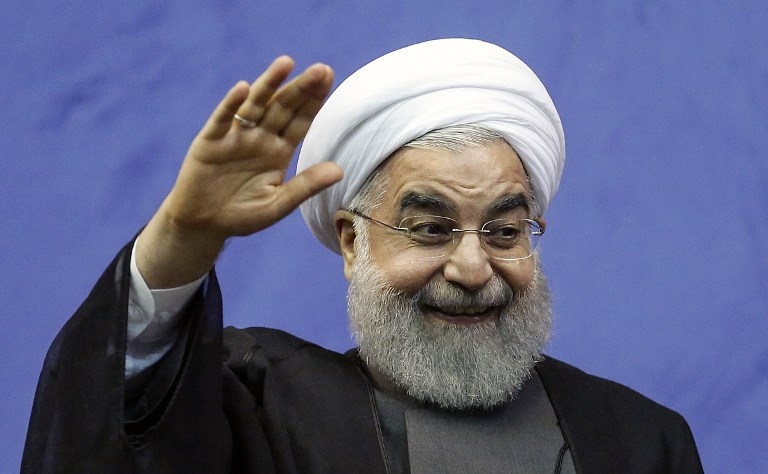
The re-election of Hassan Rouhani last week has raised significant questions about Iran’s foreign policy direction during his second term as president.
On the one hand, Rouhani came out of the presidential race victorious and gained an even stronger mandate than he did when he won the first time in 2013.
Rouhani's biggest challenge will be to moderate Khamenei’s 'revolutionary' approach to foreign policy over the next four years
On the other, in the course of his recent electoral campaign, he made several key vote-winning pledges – including pushing for the removal of all “non-nuclear sanctions” and attracting extensive foreign investment to Iran’s energy sector - that voters will expect him to fulfill.
Expectations are obviously high. Yet the reality does not seem as promising and the road ahead will likely be much tougher than the past four years for Iranian “moderates”.
In fact, the “centrist” Rouhani administration seems to be stuck between two powerful hardline groups, one at home in Tehran and another based abroad in Washington and Riyadh.
Navigating hardliners at home
Given Rouhani’s divergence of political vision with the Supreme Leader Ayatollah Khamenei - the most powerful, but not the only decision maker on state matters in Iran - his biggest challenge will be to moderate the latter’s “revolutionary” approach to foreign policy over the next four years.
This means, among other things, that while Iran’s relations with the outside world may continue to improve, or at least not deteriorate, tensions between key state institutions with competing views of foreign policy-making will probably surge.
The supreme leader has gone so far as to practically equate a shift in foreign policy with regime change
With this in mind, it is partly understandable why Khamenei stopped short of congratulating Rouhani on his landslide electoral victory in a message after the results were officially announced.
Khamenei has time and again warned that any opening in Iran’s foreign relations, particularly with Western powers, should not translate into a “change of behaviour”. He sees “a very calculated soft war against us” whose ultimate objective is the “metamorphosis” of the Islamic Republic. In his words, “They have nothing to do with the appearance, but want to change the behaviour.” The supreme leader has even gone so far as to practically equate a shift in foreign policy with regime change.
The fact of the matter, however, is that in order for Rouhani to make good on his campaign promises - including the removal of “non-nuclear sanctions” or those penalties that have been enforced on Tehran for its ballistic missile programme, human rights violations and so-called “support for terrorism” - he will need to alter some of Iran’s more controversial foreign policy practices. This is particularly hard when it comes to the resolution of regional conflicts such as the Syrian civil war through diplomacy, which may serve as a basis for Iranian-Arab rapprochement.
Finally, apart from the political frictions emanating from divergent foreign policy visions, the electorally strengthened Rouhani administration might face the kind of systematic conservative backlash that it did in the wake of Tehran’s nuclear deal with world powers in July 2015.
In response, the rate of executions at the national level soared at the same time as Iran’s military involvement in the Syrian civil war escalated, all strongly indicating that the nuclear agreement notwithstanding, the Islamic Republic was the same old “revolutionary” actor whose principles and practices had not changed.
In a similar vein, Rouhani’s attempts at a more moderate foreign policy on the back of a now stronger popular mandate might be hampered by his powerful domestic rivals’ “spoiler game”.
Winning over hardliners abroad
Yet, an equally formidable challenge lies ahead of Rouhani in the international sphere.
Saudi Arabia’s first official reaction to his re-election does not offer a bright outlook for the future of regional stability in general and bilateral Iranian-Saudi ties in particular.
While the Saudi foreign minister, Adel al-Jubeir, downplayed the impact that another four years of a “centrist” presidency in Iran may exert on its foreign policy, King Salman took the war of words to a new level, calling the Islamic Republic “the tip of the spear of global terrorism”.
Riyadh has been emboldened by the Trump administration’s more hawkish policy towards Tehran, and seems to believe that it is in the best position in a decade to take the upper hand in the region
On the one hand, Saudis have publicly made any form of meaningful rapprochement with Iran conditional on its change of regional policy, including halting support for Shia militias in Iraq, Hezbollah in Lebanon, the Assad regime in Syria, and Houthi rebels in Yemen. Such expectations are arguably unrealistic and do not stand any chance of realisation in the short run, even if Rouhani had the power to fulfill them.
On the other Riyadh, having been emboldened by the Trump administration’s more hawkish policy towards Tehran, seems to believe it is in the best position in a decade to take the upper hand in the region once and for all and isolate Iran beyond repair.
This is also partly why Saudi rulers are intentionally turning a blind eye to overtures for regional detente by the Iranian government. In this context, it is no wonder that Saudi-Israeli intelligence sharing and security collaboration has reached an unprecedented level under Trump.
Ultimately, Rouhani’s success in further redirecting Iranian foreign policy towards a more constructive and useful engagement with the world - as he has repeatedly proclaimed - depends to a great extent on the outcome of the Trump administration’s comprehensive review of its Iran policy, particularly its decisions on how to deal with the Obama-signed nuclear accord.
The bottom line is that Washington’s possible abandonment of the multilateral nuclear agreement will empower the hardliners in Tehran and thus trigger a more confrontational foreign policy on the part of the Islamic Republic. More critically, it can also set both nations and their allies on a collision course that may culminate in yet another destructive war in the Middle East.
- Maysam Behravesh is a PhD Candidate in the Department of Political Science and a Research Fellow in the Center for Middle Eastern Studies (CMES), Lund University. He was a senior editor of the Wiley-published journal Asian Politics & Policy and editorial assistant of the Sage-published quarterly Cooperation and Conflict. Maysam is also a regular contributor to Persian-language media outlets including BBC Persian.
The views expressed in this article belong to the author and do not necessarily reflect the editorial policy of Middle East Eye.
Photo: Iranian President and presidential candidate Hassan Rouhani attends a campaign rally in the capital Tehran on 13 May 2017 (AFP)
Middle East Eye propose une couverture et une analyse indépendantes et incomparables du Moyen-Orient, de l’Afrique du Nord et d’autres régions du monde. Pour en savoir plus sur la reprise de ce contenu et les frais qui s’appliquent, veuillez remplir ce formulaire [en anglais]. Pour en savoir plus sur MEE, cliquez ici [en anglais].



